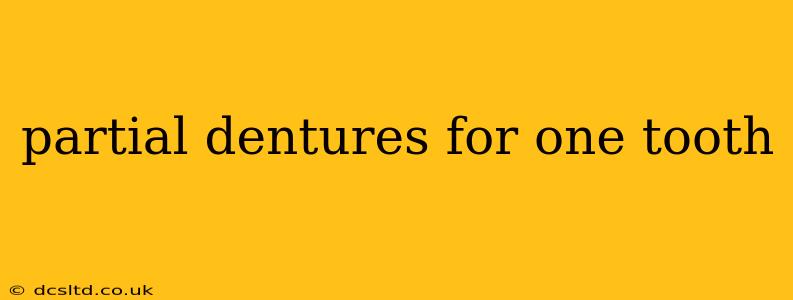Losing even a single tooth can significantly impact your smile, confidence, and ability to chew comfortably. While dental implants are often the preferred solution for replacing missing teeth, a partial denture might be a suitable and more affordable alternative, especially for replacing just one tooth. This comprehensive guide explores the intricacies of using partial dentures for a single missing tooth, addressing common questions and concerns.
What is a Partial Denture?
A partial denture is a removable appliance designed to replace one or more missing teeth. Unlike full dentures, which replace an entire arch of teeth, partial dentures fill gaps in existing dentition. They typically consist of artificial teeth attached to a pink-colored base that mimics gum tissue, often made from acrylic resin. Metal frameworks are sometimes incorporated for added strength and stability. For a single tooth, the partial denture will be quite small and discreet.
Why Choose a Partial Denture for One Missing Tooth?
While a dental implant is often the gold standard for replacing a single tooth, a partial denture offers several advantages:
- Cost-effectiveness: Partial dentures are generally less expensive than dental implants, making them a viable option for those on a budget.
- Faster procedure: The process of fitting a partial denture is usually quicker than that of a dental implant, which requires a longer healing period.
- Less invasive: Partial dentures require less preparation of the surrounding teeth compared to dental implants.
- Reversibility: If needed, a partial denture can be easily removed and replaced.
What are the Disadvantages of a Partial Denture for One Tooth?
Despite its advantages, a partial denture for a single tooth also presents some drawbacks:
- Less natural feel: A partial denture might feel less natural than a dental implant.
- Potential for discomfort: Some individuals experience discomfort or irritation from the denture's base initially.
- Maintenance: Partial dentures require daily cleaning and care to maintain oral hygiene and prevent infections.
- Loose fit: Over time, the fit of the partial denture may loosen, requiring adjustments or replacement.
Is a Partial Denture Right for Me?
The suitability of a partial denture for replacing a single tooth depends on various factors, including:
- The location of the missing tooth: The position of the missing tooth influences the design and stability of the partial denture.
- The health of your surrounding teeth: Sufficient healthy teeth are necessary to provide support for the partial denture.
- Your overall oral health: Existing gum disease or other oral health issues may impact the success of a partial denture.
- Your budget: The cost of a partial denture should be considered against the cost of other restorative options.
Only a dentist can accurately assess your individual needs and determine whether a partial denture is the best solution for you.
How Long Do Partial Dentures Last?
With proper care and regular dental checkups, a partial denture can last for several years. The lifespan of a partial denture depends on factors such as the quality of materials used, the patient's oral hygiene habits, and the amount of wear and tear.
How Much Does a Partial Denture for One Tooth Cost?
The cost of a partial denture varies widely depending on the materials used, the complexity of the design, and the dentist's fees. It's best to consult with your dentist to get a personalized cost estimate.
Are there alternatives to a partial denture for one missing tooth?
Yes, several alternatives exist, including:
- Dental implants: These offer a permanent and highly natural-looking solution.
- Dental bridge: A bridge uses adjacent teeth to support the replacement tooth.
- Nothing: While this is an option, it can lead to shifting teeth and bite problems over time.
Your dentist can help you weigh the pros and cons of each option to determine the best course of action for your specific situation. It's crucial to have a thorough consultation to discuss your individual needs and preferences before making a decision. Remember, maintaining good oral hygiene is essential regardless of the chosen restorative option.
